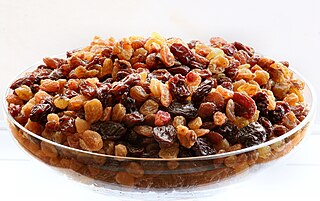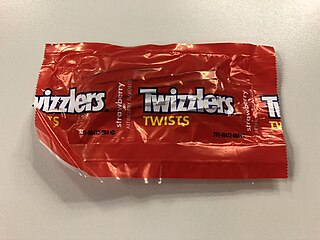
A grape is a fruit, botanically a berry, of the deciduous woody vines of the flowering plant genus Vitis. Grapes are a non-climacteric type of fruit, generally occurring in clusters.

A raisin is a dried grape. Raisins are produced in many regions of the world and may be eaten raw or used in cooking, baking, and brewing. In the United Kingdom, Ireland, New Zealand, Australia and South Africa, the word raisin is reserved for the dark-colored dried large grape, with sultana being a golden-colored dried grape, and currant being a dried small Black Corinth seedless grape.

Table grapes are grapes intended for consumption while fresh, as opposed to grapes grown for wine production, juice production, or for drying into raisins.

Pollination of fruit trees is required to produce seeds with surrounding fruit. It is the process of moving pollen from the anther to the stigma, either in the same flower or in another flower. Some tree species, including many fruit trees, do not produce fruit from self-pollination, so pollinizer trees are planted in orchards.

Twizzlers are a licorice-type candy manufactured by Y&S Candies, Inc., of Lancaster, Pennsylvania, a division of The Hershey Company. Twizzlers were first produced in 1929 by Young and Smylie, as the company was then called. The licorice company was founded in 1845, making it one of the oldest confectionery firms in the United States. Twizzlers ingredients consist of corn syrup, wheat flour, sugar, cornstarch, and smaller amounts of palm oil, salt, artificial flavor, glycerin, citric acid, potassium sorbate, Red 40, and soy lecithin. Despite only the black Twizzlers containing extracts of the licorice plant, Twizzlers products are collectively referred to as licorice-type candy. Seventy percent of the annual production of Twizzlers are strawberry, the most popular Twizzlers flavor.

The sultana is a "white", oval seedless grape variety also called the sultanina, Thompson Seedless, Lady de Coverly (England), and oval-fruited Kishmish. It is also known as İzmir üzümü in Turkey since this variety has been extensively grown in the region around İzmir. It is assumed to originate from Asia Minor, which later became part of the Ottoman Empire.

Jolly Rancher is an American brand of sweet hard candy, gummies, jelly beans, lollipops, sour bites, and a line of soda put out by Elizabeth Beverage Company in 2004. Originally created in Colorado in the 1950s, the Jolly Rancher brand has been owned by The Hershey Company since 1996.

Stenospermocarpy is the biological mechanism that produces parthenocarpy (seedlessness) in some fruits, notably many table grapes.

Dekopon (デコポン) is a seedless and sweet variety of satsuma orange.
The Ferrara Candy Company is an American candy manufacturer, based in Chicago, Illinois, and owned by the Ferrero Group.

Coronation grapes are a hybrid variety of table grape developed in Canada. Coronation grapes are popular throughout Canada, and are available during a short period in late summer and early fall. These grapes are characterized by their "vibrant blue-purple" colour, similar to the related Concord variety.

Thomcord is a seedless table grape variety and a hybrid of the popular Thompson Seedless or Sultanina grape and Concord grape. Thomcord was developed in 1983 by Californian grape breeders working for the Agricultural Research Service (ARS), an agency of the United States Department of Agriculture (USDA), as part of a test to better understand a new seedless grape breeding procedure.
Cabernet blanc is a white German and Swiss wine grape variety that is a crossing of the French wine grape Cabernet Sauvignon and the hybrid grape Regent. The grape was bred by Swiss grape breeder Valentin Blattner in 1991. Cabernet blanc has strong resistance to most grape disease including botrytis bunch rot, downy and powdery mildew and tends to produce loose clusters of small, thick-skinned grape berries which can hang on the vine late into the harvest season to produce dessert wines. Today the grape is found primarily in the Palatinate wine region of Germany with some experimental plantings in Spain and the Netherlands. In France, in the Languedoc, Domaine La Colombette is heavily investing in PIWI grapes. Amongst others the Cabernet Blanc in their cuvée "Au Creux du Nid", is gaining wide acclaim.

The propagation of grapevines is an important consideration in commercial viticulture and winemaking. Grapevines, most of which belong to the Vitis vinifera family, produce one crop of fruit each growing season with a limited life span for individual vines. While some centenarian old vine examples of grape varieties exist, most grapevines are between the ages of 10 and 30 years. As vineyard owners seek to replant their vines, a number of techniques are available which may include planting a new cutting that has been selected by either clonal or mass (massal) selection. Vines can also be propagated by grafting a new plant vine upon existing rootstock or by layering one of the canes of an existing vine into the ground next to the vine and severing the connection when the new vine develops its own root system.

Cotton Candy is the trademark for a variety of sweet white table grapes of the cultivar IFG Seven whose flavour has been compared to cotton candy. The grapes were developed by horticulturist David Cain and his team at Bakersfield, California-based fruit breeder International Fruit Genetics (IFG). The grapes are produced in California by grower Grapery, which began selling them in 2011.

Lapins is a cultivar of cherry. It is a hybrid of the Van and Stella cultivars. It has been awarded the Royal Horticultural Society's Award of Garden Merit.
The Pacific Agri-Food Research Centre is an agricultural research centre in British Columbia, Canada. The centre has been historically important in the development of tree fruits. It is administered by Agriculture and Agri-Food Canada and includes sites at Summerland and Agassiz.
Van is a cultivar of cherry originating from Canada.
EverCrisp is an American apple cultivar developed by the Midwest Apple Improvement Association (MAIA). Trademarked as EverCrisp, the MAIA-1 variety is a cross between two existing apple cultivars: the Honeycrisp and Fuji. Originally produced in Ohio, EverCrisp has since expanded to apple-growing regions across the Midwest in Michigan, Illinois and Indiana, in the Northeast in Pennsylvania and New York, and in the Northwest in Washington. The apple entered the public marketplace in 2017.















